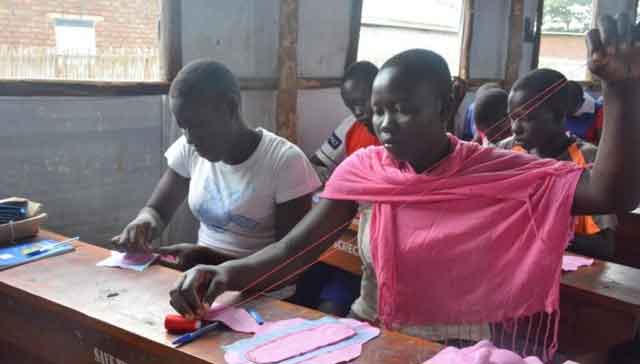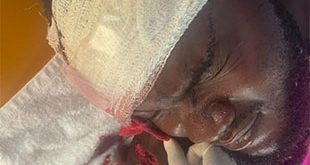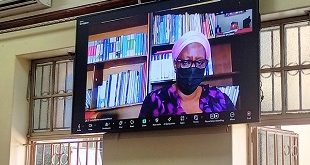
Kampala, Uganda | THE INDEPENDENT | The Ministry of Education has finalized plans to distribute sanitary towels, petty Coats, and knickers to close to 15,000 vulnerable girls across the country. The initiative is part of the seven billion Shillings project under the Global Fund, to keep girls in schools.
Ismail Mulindwa, the Director of Basic Education in the Ministry of Education says that although the Ministry had initially wanted to only distribute sanitary towels, they later discovered that many of the intended beneficiaries could hardly afford underwear.
The news brings a ray of hope for hundreds of girls, especially those in rural schools who miss or drop out of school because they cannot afford sanitary wear especially they begin menstruating. A packet of sanitary pads cost an average of 3,000 Shillings on the market, a cost which is unreasonable for girls in rural settings.
As a result, many girls use tree leaves, rags, toilet paper, newspapers and cotton wool, to protect themselves from leaks, while others are isolated for the entire week or forced to sit in the sand for days until their menstrual flow stops. Under such circumstances, girls have been forced to drop out of school to avoid embarrassment.
“We have learnt that in search to get such items, at times girls are lured into unspeakable acts and end up contracting HIV/AIDS. Others get early pregnancies and end up dropping out of school,” Mulindwa told Uganda Radio Network.
Meanwhile, Daniel Amanyire, the Assistant Programs Officer in the gender unit at the Ministry of Education shares that they developed a tool using the national demographic data to identify 49 districts with the highest need. Amanyire says that the plan is to identify 12 schools in each of the selected districts. The support will be extended to 25 girls in each of the schools.
“Those girls will be identified by the community leaders and teachers. They might be orphaned, they can also be from HIV affected families or any other category deemed fit,” Amanyire added.
Evelyn Kigongo, the Executive Director of Change a Girl Uganda, noted that the project is good given the fact that there will a girl whose future can be saved from the gallows of men who take advantage of their vulnerability. However, she argues, that the target is too small and not sustainable. Kigongo advises the government to empower girls to make their own sanitary pads.
But, Amanyire says that the initiative will be complementing the ministry aspiration to ensure that all school-going girls have access to menstrual hygiene requirements. He says that ever since the president pledge to have a universal programme addressing the matter at hand, they have been putting up several initiatives.
“We have told headteachers to allocate some funds off the capitation grant to ensure that they give these requirements to needy girls. we have also, as the gender unit put up programmes empowering girls on Menstrual management. Some components in this aspect is geared towards teaching them how to make reusable pads as one of the sustainable ways towards this challenge,” says Amanyire.
Although there is not enough and accurate information from both the community and national levels on shortfalls on menstrual hygiene management, data obtained from the Economic Policy Research Centre website indicates that girls miss up to eight days of school every term due to menstruation and poor access to sanitary products.
Apart from access to sanitary pads, the absence of toilet facilities is another factor hindering good Menstrual Hygiene Management. Amanyire notes that the ministry has also changed latrine designs for schools to accommodate menstrual hygiene requirements like incinerators and changing rooms.
Early this year, Parliament’s Finance Committee endorsed a government proposal to exempt excise duty on raw materials used in the manufacture of sanitary pads. Committee Chairperson Henry Musasizi said that making pads affordable would save young girls from the embarrassment of leaks during their menstruating period, improve their menstrual hygiene and restore the dignity and wellbeing of women and girl.
*******
URN
 The Independent Uganda: You get the Truth we Pay the Price
The Independent Uganda: You get the Truth we Pay the Price


